Is karma real?
Not only is karma real, but sometimes karma’s a real son-of-a-bitch as well.
It doesn’t matter what whether you believe in karma or you think it’s garbage; it exists and it believes in you.
Unfortunately, most people find this out the hard way. Especially on the internet.
Avoiding bad karma
If you follow me on Twitter, you know that I’m one of the more polite people you’ll ever meet on the internet.
Even when I troll, it’s poking fun at myself and making people think I’m a crackhead or that I was someone’s prison bitch. I don’t intentionally antagonize or insult anyone.
Surprise sex is the best way to wake up--unless you're in prison.
— Ed Latimore (@EdLatimore) March 11, 2020
I talk to everyone on the internet as I would talk to them in person. I try to have fun, teach, and build some good “digital karma” for myself.
It’s not a marketing ploy. It’s who I am.
I’m a 35-year-old ex-heavyweight boxer who grew up in a hell of a public housing project. I don’t need to play tough on the internet. My real life was tough enough.
Most of you know that about me but for those of you who are new here, I wanted to set the tone for this karmic lesson someone learned about communicating with other human beings on social media.
But first, let’s settle in on exactly what I mean by “karma”.
Your actions will come back to haunt you—this isn’t spiritual; just real life
I personally don’t believe in the idea of karma as it’s presented in Hinduism or Buddhism. To me, their presentation of cause and effect is too spiritual to explain everyday occurrences.
I don’t think what you did in a past life (if such a thing exists) has anything to do with your current experiences. When I’m talking about karma, I’m just talking about the benefits or punishment you receive in the future for your current behavior.
Sometimes, if your actions are severe enough, that karma takes the form of prison. It doesn’t get that bad for most of us. Instead, we simply find out that we crossed the wrong person. They have a longer memory, farther reach, and greater influence than we thought.
Or sometimes, a record of our actions remains on the internet and we’re forced to answer for being an internet troll. This is karma in the internet age.
I always tell people that you should be nice on the internet because you never know who’s watching. Think of this as my warning about digital karma.
I’ve had too many people of significant influence, prominence, or fame reach out to me in my DMs for me to tell you otherwise. A lot of the support I’ve received in building my position and network is because I try to add value and use the internet as a place to do good deeds.
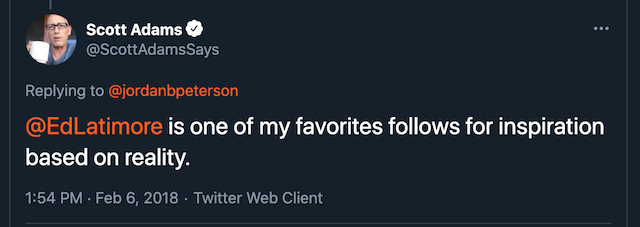

People take notice and want to help. You can call this “good karma of the internet”.
A big part of adding value and building good karma (if not the most important part) is NOT being an asshole. When you act like an asshole, you are ruining opportunities for yourself that you didn’t even know existed. You’re creating bad karma for yourself.
If you don’t believe in the law of karma, perhaps this post will change your mind. At the very least, it will get you to consider the cause-and-effect relationship between your online and offline presence.
If you aren’t going to go full-anon (as opposed to semi-anon, an important distinction for today’s post), you don’t know what opportunities you’re repelling or attracting to yourself.
When you create this “bad karma of the internet” for yourself, bad things may happen to you because you taking value instead of building it.
With that said, let’s talk about the concept of karma and how someone interacting with me on the internet learned a hard lesson about “what goes around comes around.”
Check out the rest of my articles on living in the hood
3 lessons from an internet troll
1) You never know who’s watching and can ruin your life
A few days ago, I received the following email. I’ve cut off the email address and name of the sender.
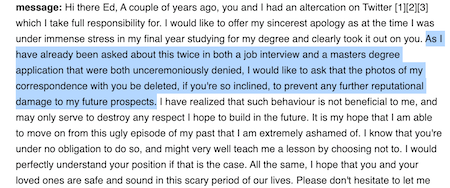
Although I have no memory of this event, he seems to be learning just how much of a bitch karma can be when you get on her bad side.
He attached the tweets to jog my memory. Those are the citation numbers that follow “Twitter” in the first sentence. I’ll share with you the tweets in question.
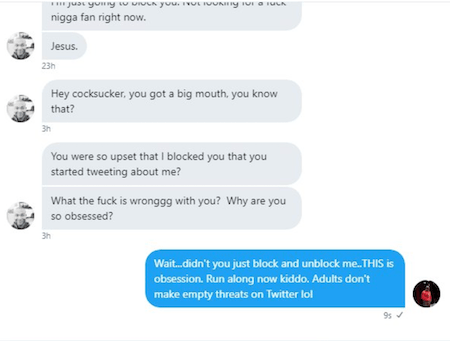
I’m the blue conversation. Even though he sent me a DM, I don’t respond negatively to him.
I don’t remember how this started, but I believe he blocked me after saying something disrespectful to me. In response, I screenshot his messages to me and then wrote his handle in a tweet I shared with the public. I did this knowing that his bad manners would be met with harassment from many of my followers.
It worked. This wasn’t the last of the messages.
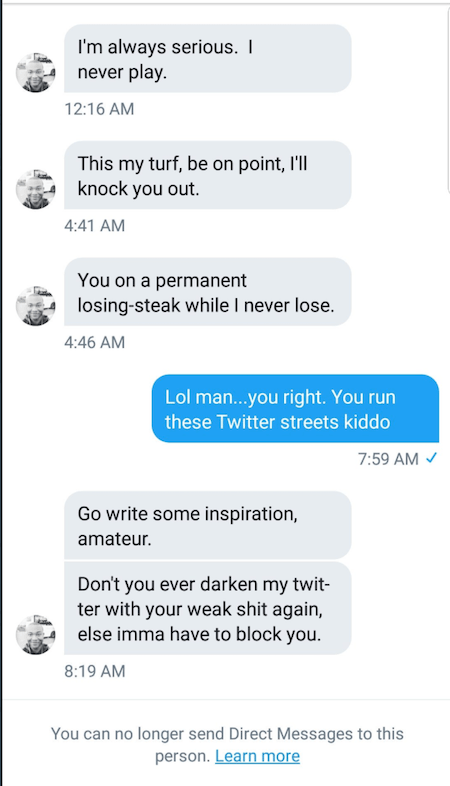
I know that the message implies 3 tweets, but the third one is a duplicate. Let’s dig into some of the karma lessons here and answer many questions I got when I posted the original message on social media.
Why didn’t he just delete his Twitter account?
To this guy’s credit, he actually did delete his social media account shortly after. The problem is that he didn’t post tweets. I did. You’re probably wondering how the job and master’s program discovered this colorful interaction.
I was wondering that too, so I asked him in a follow-up email. Well, it turns out that his Twitter handle was the same as the URL of his website. I imagine he’d been putting that URL on his applications to show off something related to his work.
When you google said URL (I’m not putting it here, as I agreed to no longer play a role in messing up his karma), the first thing that comes up is the tweet screenshots linked to my account.
The lesson here is that there’s no such thing as a “halfway anon”. Either go fully ghost or be fully out in public. Even if you try to be halfway anon, any identifying details can be used to track you. Get on the wrong side of the wrong people, and you’ll quickly find out just how bad karma can be and how easy it is to be doxxed.
For example, if you think you can get away with just putting your face on a profile and nothing else, you’d be sorely disappointed. Image searching and matching algorithms have come a long way.
Do you think you’re safe because your social media is private, and therefore ONLY people you allow can see it?
Do not underestimate the resolve of someone with a lot of time and a little creativity. This goes double for a company that likely employs someone to research people or, at the very least, gives someone that job in addition to other duties so there is a bit of financial compensation.
You’re only as anonymous as the resources and motivation of the person who wants to find you.
If you’re going to be anon
Use different handles from your name (obviously) or anything associated with your online presence (which is not so obvious and is causing this guy misery). Make sure that your handles don’t have:
- Any URL that you own
- Companies you work at
- The city you’re from
- The school you attend
And for goodness sakes–and I know that I already said this–DON’T USE AN ACTUAL PHOTO OF YOURSELF. That can easily be traced and linked to your presence on any media, company site, school site, or social media profile.
If you’re going to be fully out in public
Use the internet to your advantage. You want to make sure that when people google you, stuff comes up that makes you look better. Not worse.
There are many ways to do this, but it basically boils down to creating stuff. If you’re using your real information and YOU aren’t trying to work for yourself (or you’re already in a power position), you’re asking for trouble.
The moment you say something disparaging and someone decides to archive it, that’s what’s going to come up on the first page when people search for you.
On to the next lesson about karma on the internet…
2) Don’t make bad karma for free
So, fortunately, this kid realized operating that account or anything related to it was a wash. From a follow-up response he sent to me:
“Both the domain and Twitter have since been deleted. And I’ve since abandoned any notions of building a personal brand.”
Consider this though: he was attached enough to the name and what he put behind it that he not only used it for his Twitter handle and website but also referenced it in his applications for grad school and a job.
I should point out here that the URL and Twitter handle in question was NOT his actual name.
He made his life harder for no other reason than wanting to be disrespectful and talk recklessly to me on the internet. Even though he deleted the Twitter account and his website, I did some digging and found that he took both of those actions quite some time ago. He only wrote this plea last week.
That means that somehow, this is still causing him problems. I have two theories on how that’s possible:
The first feeds my ego
I’m more well-known than the average person. If we went by nothing else than the quantity and quality of people who follow me on Twitter, that would be enough to make the case. Depending on which SEO tool you use, my name receives between 1800 and 4500 searches on the internet per month. I even have a Wikipedia page.
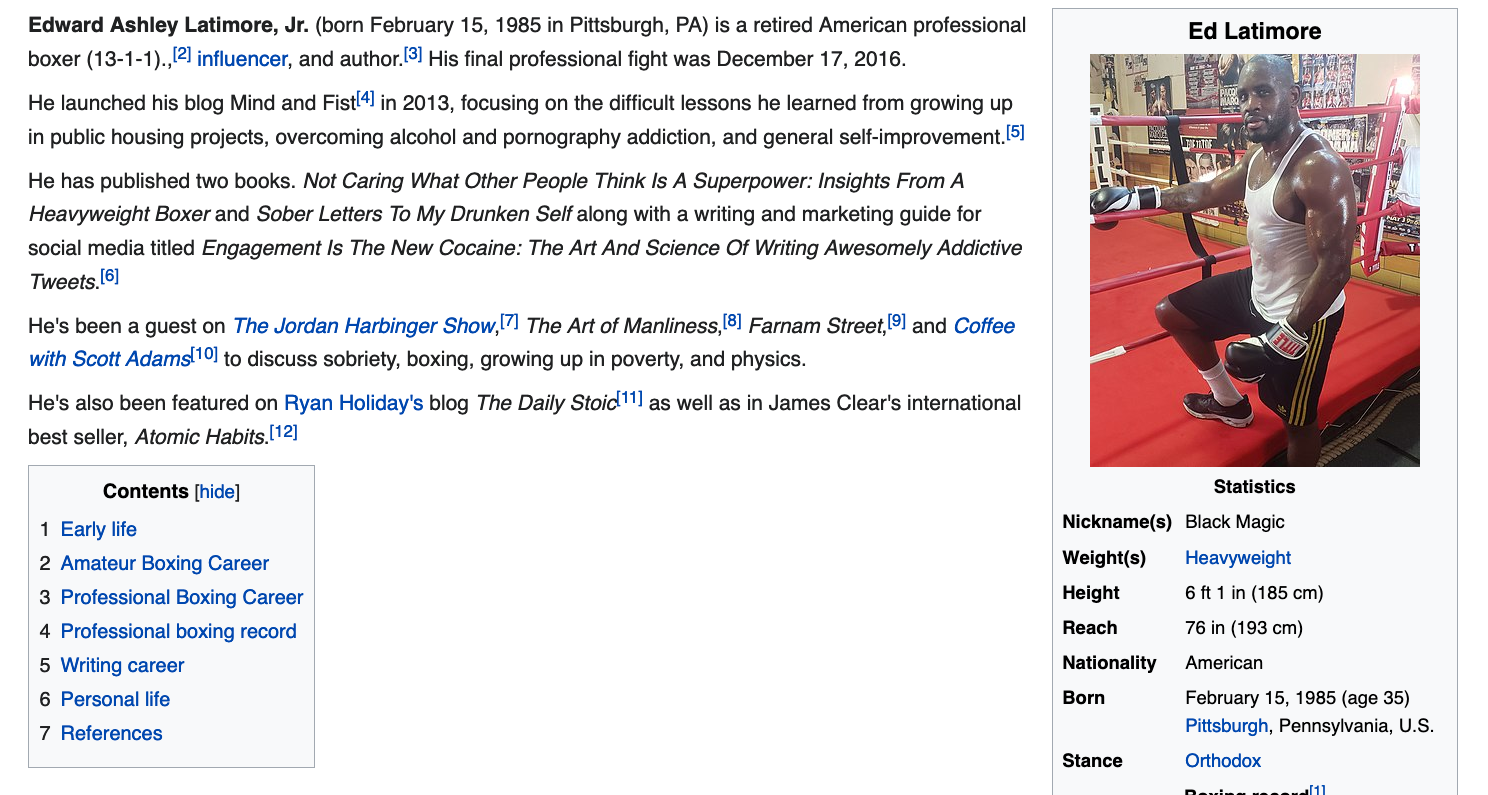
There’s a good chance that someone who’s a fan knows that he was a royal dick to me and now he’s paying for it. This is highly unlikely for many reasons, but I think about the places I’ve been recognized because of my Twitter account.
If my identity got me through a TSA checkpoint faster, this is not completely out of the realm of possibilities.
The second is more likely and reiterates the first lesson
Despite what he told me and what I’ve observed, his name is still attached to his handle somewhere that’s important enough that an employer might still google and the screenshots come up. Perhaps it’s a middle name or something.
If I were vindictive, I’d just leave everything up to continue causing this kid problems. But I’m not, so I deleted the tweets. I don’t want bad karma.
But imagine if I wasn’t going to do that. That would mean that this kid made someone his enemy, knowing nothing about the scope of his reach or influence, all so that he could win an internet trash-talking contest. That’s a very poor trade-off.
Here’s a secret to how I keep such a cool head with people on social media:
I recognize that it’s a tool to connect me to money and power. I know that every enemy I make is an entire network I close myself off to in the present and one that I potentially exclude myself from in the future.
It’s selfish, but it produces a positive result. Because I’m out for me, I’m motivated to treat everyone around me right–even when they don’t deserve it. My ruthless adherence to my self-interest is responsible for building my good karma on the internet.
3) A good apology is one that you don’t have to make in the first place
People are more forgiving when you get in front of your problems before they cause major harm. Apologies mean more when you don’t have to make them.
As long as you handle your personal problems before they cause a big problem for other people, you are never beyond redemption.
A few people have made a point that is worth considering.
This guy is only writing to me because he can’t escape the problem that his actions are causing him. He had 2 years to reach out and apologize to me if he truly felt bad for how he acted. Instead, I only get an apology when he wants me to delete the tweets.
Some people thought I should leave them there. Well, I’m not, but that’s because I think that maybe this experience has been so painful that moving forward, he will treat people with more respect.
With that said, he’s lucky that I am the way I am. A more vindictive person would have written back telling him to shove his apology while raising the exact point I’m making in this lesson.
Look, we all mess up. But you can’t count on the mercy of those you offended when the consequences of your actions come home to roost.
If you want people to really show leniency, take your lamentations seriously, and give you a second chance, own your mistakes early and do so without the expectation that you won’t have to deal with the consequences.
Recap of the lessons about the law of karma from an internet troll
- You never know who’s watching and can ruin your life
- Don’t make bad karma for free
- Apologies mean more when you don’t have to make them
Try to act in a way that won’t require you to apologize to your future self for something stupid that you do today.
While you can’t predict exactly how a situation will turn out, you know if something has the potential to hurt you down the line. If you’re wondering how to know, follow this simple advice:
Act towards people in a way that brings out the best in them. It’s not perfect, but it should prevent you from being an asshole. You might even make someone’s day a little brighter.
At the very least, you won’t ever have to worry about your words coming back to keep you out of school or a job.


